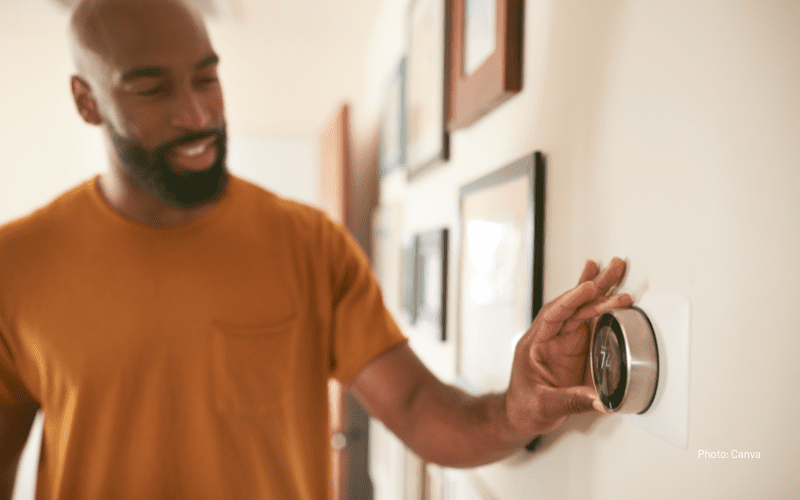
Investing in more efficient technology to power our homes and businesses now can save us money on our utility bills in the long run.
Energy Efficiency Basics
- Energy efficiency is not just about conserving energy. It’s about getting more bang for your buck, like a refrigerator or air conditioner that uses less energy to generate the same amount of cooling power.
- Energy efficiency is beneficial at every level of our economy, from family homes and apartment buildings to office complexes and factories. The more we scale up efficiency, the more energy we save and the more benefits we see. When we move on from outdated technology that uses a lot of extra energy, we reduce stress on our electricity grid, cut pollution, and protect ourselves from the volatile price spikes of oil and gas.
- All New England families and businesses should have easy access to energy efficiency programs and technologies, regardless of whether they rent or own and regardless of income level. And we must pair it with launching more clean energy to power our homes and appliances, so we can stabilize energy rates and get off fossil fuels for good.
What Does It Mean to Have More Energy-Efficient Options?
Being energy efficient is about increasing access to smarter technology. It’s also about low-cost fixes that give people the option to use less energy. You don’t need to freeze in the winter, boil in the summer, or sit in the dark to save power. Instead, you can keep your home comfortable by patching holes in your insulation or adding better seals to doors and windows. You can also install more energy-efficient appliances when it’s time to replace your old ones. Efficiency experts have already done the research pointing us to the best technology to keep our homes and buildings snug in the cold and cool in the heat – all while saving money on electricity bills.
For example, heat pumps are one of the latest, all-in-one energy-efficient technologies that New Englanders are choosing to heat and cool their homes. Like any major appliance, they require an upfront investment. Still, they save money on energy bills over the long term because they use about half the amount of power as older furnaces and air conditioners. Maine is the leading state in heat pump adoption, surpassing its initial goal of installing 100,000 heat pumps and now aiming to install 175,000 pumps by 2027.
Across New England, communities can follow Maine’s energy-efficiency lead by installing high-efficiency HVAC, appliances, and lighting systems in schools, libraries, public offices, and buildings – even streetlamps. Businesses can replace energy-sucking printers and drafty windows with newer, efficient models. And factories can update aging systems to use newer equipment that draws less power.
How Does Energy Efficiency Help Me (and the Planet)?
With an upfront investment and support from state efficiency programs, you can save big on your electricity bills. Not only are you paying for less electricity, but if every home, business, and public space is more efficient, the price of energy will go down across the board. This happens because our grid operator (ISO New England) turns to the most expensive and polluting power plants, like those that burn oil, when faced with high energy demand. As we lower demand, we will need less of these extra costly and dirty fuel supplies.
What’s more, while states ramp up efforts to end our reliance on climate-damaging fossil fuels, we will all be using more electricity for heat and transportation. Getting smart about energy efficiency now will help us manage that increased demand for power while we work to leave polluting and expensive fossil fuels behind.
How Can New England Become More Energy Efficient?
For every dollar invested in energy efficiency, we see two to three dollars’ worth of energy savings. That’s a great return on investment.
With federal cuts threatening incentive opportunities like the Inflation Reduction Act, what we need to do now is double down on energy efficiency programs. Currently, every state in the region has a program specifically designed to help you make energy efficient improvements to your home. These include MassSave, NHSaves, Efficiency Vermont, Efficiency Maine, Energize Connecticut, and Energy Saving Programs in Rhode Island, and all state programs except Maine’s are mandated by regulators or utility commissions. Most of these programs offer a free home energy assessment to help you figure out where to start – and that’s available whether you rent or own your home. They also provide assistance to businesses and institutions.
However, across the region, these programs are underfunded and aren’t reaching as many renters or low-income families as they should. They can also lack language access, meaning that families or businesses whose primary language isn’t English are missing out on the benefits. Energy efficiency only works to slash emissions and our electricity bills if it’s accessible to every New England renter, homeowner, and business owner.
We also need to make sure our utility companies are doing their part by adequately funding – and not undermining – these programs. And we need to hold our utilities accountable and help them devise new business models. Right now, some utilities make money by selling more power and building new poles and wires to carry that power. Others simply lack strong enough incentives to prioritize efficiency. We must shift their model so they can help us save electricity while still making a profit – and help protect our climate while they’re at it. New England’s governments must join the effort, too.
It’s up to us to demand strong energy efficiency programs so that we can save money on our electric bills and lower carbon pollution across the region. Beyond simply taking advantage of your state’s energy efficiency program, you can express support for these programs and for efficiency legislation by emailing regulators and calling local legislators. And let your city and town officials know that you want to see measures taken to make public spaces and town buildings more efficient, too. Because the cleanest, cheapest energy is the energy we don’t use at all.
Sign up for CLF emails to stay up to date on the latest in energy efficiency and opportunities to make your voice heard.



